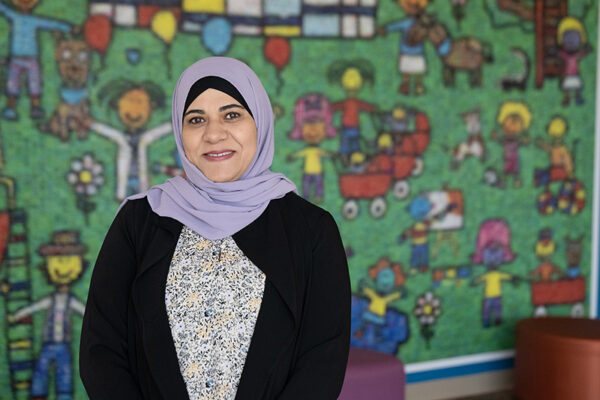
Hanya Salem is a certified medical interpreter for Arabic to English at Akron Children’s.
Observed in April, Arab American Heritage Month celebrates the rich and diverse culture and contributions of Arab Americans. Hanya Salem is a certified medical interpreter for Arabic to English. Through her work at Akron Children’s, she provides language access services to patients and families, an essential component of delivering culturally competent care. She shares what this month means to her and how she celebrates with her family and friends.
How long have you worked with the hospital, and what’s your role?
I have been working with Akron Children’s since May 2016 as a certified medical interpreter for Arabic.
What do you enjoy most about your work at Akron Children’s?
I love being the bridge between my Arabic-speaking patients and the care team. Helping patients, from routine wellness checks to major surgeries, makes my life complete. Interpreting for parents to help them understand their child’s diagnosis and treatment by using the terms and accent they use makes the appointment successful.
What does Arab American Heritage Month mean to you?
As a Muslim Arab American, I celebrate my faith, rich culture, and traditions, which have a great impact on U.S. culture, as well. This month helps us change the negative view of Muslims and Islam. It also helps us showcase our differences and diversity no matter where we came from.
How do you recognize, honor and celebrate your Arab American heritage?
I celebrate this month by treating everyone with loyalty and respect and teaching my kids the Arabic language and traditions, so they can one day teach it to their kids. I keep Middle Eastern cuisine a part of our meals, visit our families and friends to stay connected to our roots, and educate my kids about the struggles and the challenges that Arab Americans have faced, like Islamophobia and racism.
As we strive to deliver culturally competent care and create an inclusive environment for our patients and families, what would you like others to know?
We can strive to serve our patients and families better by respecting their cultural differences, values, beliefs and customs. Always ask questions about their unique customs and background. Having knowledge of food restrictions and dietary needs is also important, as well as being aware of the body language, tone of voice and what is culturally acceptable for them.










